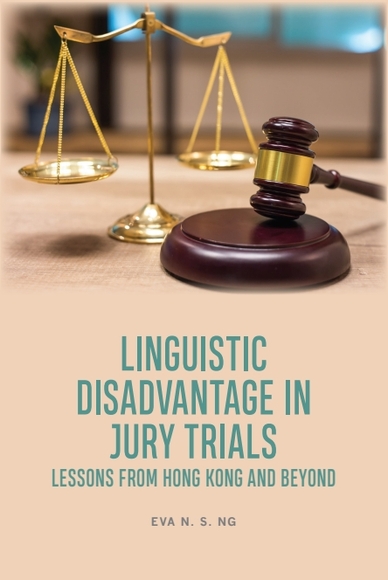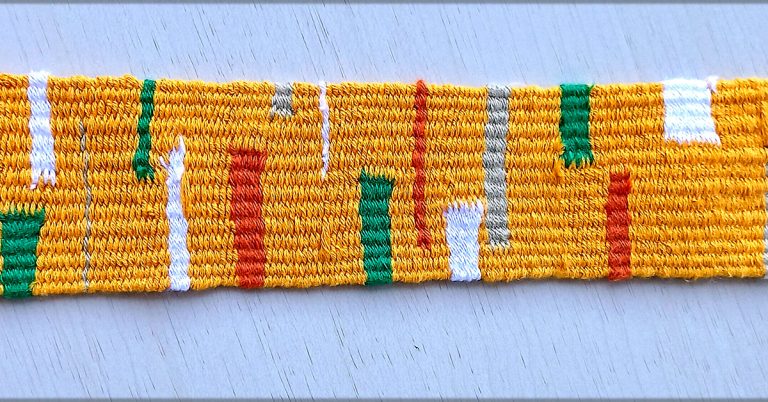
by Eva Ng

Linguistic Disadvantage in Jury Trials is the first empirical study to test Chinese jurors’ comprehension of court proceedings conducted in English.
Tell us a bit about your book.
My book presents the findings of a groundbreaking study that investigates how well Chinese jurors in Hong Kong understand English-medium court proceedings. Using authentic audio recordings from two real jury trials, the study examines jurors’ comprehension of what’s happening in the courtroom.
Hong Kong’s legal system is rooted in its colonial history, practising common law and utilising juries in serious criminal trials and death inquests. Since inheriting the common law legal system, Hong Kong has maintained the use of English as a trial language—initially the sole language, now alongside Cantonese. For this reason, the ability to understand English is an important requirement for jury service, based primarily on education levels. However, in a Chinese society where about 90% of the population speaks Cantonese as their dominant language, this means a large proportion of the local community with low education levels are excluded from the jury pool. This raises questions about how representative juries in Hong Kong are. There are also concerns about whether those Chinese jurors truly understand court proceedings conducted in English.
My study reveals that many eligible Chinese jurors face significant comprehension challenges during English-language trials. These difficulties go beyond complex legal jargon—they also include issues with plain English, often stemming from how information is delivered by speakers.
The book also discusses a notable legal case involving an appeal over whether Chinese jurors should have access to Cantonese interpretation, provided on a day-to-day basis for local defendants and witnesses. I argue for extending the service to jurors who need it. Interpreting for jurors in Hong Kong serves a practical purpose: Improving jurors’ comprehension to safeguard defendants’ right to a fair trial. With access to Cantonese interpretation, citizens with little or no English proficiency will be able to participate in jury service. This will make juries more representative of the community—a fundamental principle jury trials, that is, trial by peers. This issue isn’t unique to Hong Kong; it’s relevant to many multilingual societies where the jury system is in place.
What inspired you to research this area?
Before becoming an academic, I worked as a court interpreter. That experience gave me firsthand insight into the complexities of courtroom language and how judges and lawyers communicate. I wondered how much Chinese jurors truly understood when instructions, arguments, and testimony were delivered in English. My curiosity grew after reading similar studies in English-speaking jurisdictions, which showed that even native English-speaking jurors often struggle to comprehend legal instructions. I wanted to explore whether the comprehension issues would be even more pronounced for Chinese jurors, who might be labouring under the double disadvantage of having to understand legal discourse in a foreign language. In other words, for Chinese jurors, it’s more than just the ability to understand legal language as laypersons; it’s also about their competence in the English language itself.
What was the most exciting thing about this project for you?
The highlight was securing permission from the High Court Registrar to use audio recordings of two actual jury trials—making this the first study of its kind to analyze real courtroom data to assess juror comprehension. This was a significant milestone. The project was also supported by funding from the Research Grants Council of Hong Kong. An additional thrill was being awarded a 10-month visiting scholarship by the Harvard-Yenching Institute, which allowed me to dedicate focused time to developing the book and incorporating the study’s findings.
Did you discover anything particularly surprising or unusual?
Yes. The Court of Final Appeal’s ruling on an appeal related to jurors’ access to Cantonese interpretation was especially unexpected and troubling. The decision has serious implications for the future of court interpreting practices in Hong Kong and highlights the court’s double standard regarding the mode of interpreting adopted in court and the quality of interpretation for defendants and for jurors.
Did you gain access to any rare or hard-to-find sources?
Absolutely. I was granted exclusive access to the recordings of two English-medium jury trials—an invaluable resource that made this research possible. Without these authentic recordings, it would have been impossible to analyze actual courtroom interactions and juror comprehension.
Has your research changed how you see the world today?
It reinforced my belief that providing interpreting services for Chinese jurors in Hong Kong is essential. The right to a fair trial depends on jurors fully understanding the proceedings. If they don’t, the fairness of the trial—and the legitimacy of the jury system—are compromised. Ensuring jurors’ comprehension and their representation is crucial for upholding justice in diverse societies.
I hope this book sparks further discussion and prompts reforms that make jury service truly inclusive for Hong Kong, and for other multilingual societies around the world where the jury system is practised.

About the author

Eva Ng is Associate Professor of Translation in the School of Chinese at the University of Hong Kong. Her research interests include legal translation and interpreting, bilingual courtroom discourse analysis, and jury comprehension. She has authored, co-authored and co-edited books, and has published articles and book chapters in these fields.





